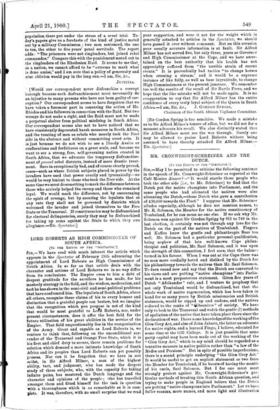LORD ROBERTS AS HIGH COMMISSIONER OF SOUTH AFRICA.
[TO THE EDITOR OP THE "SPECTATOR."] Sin,–.-We have read with much interest the article which appears in the Spectator of February tl-Ith advocating the appointment of Lord Robeats as High Commissioner of South Africa. In so far as that article deals with the character and actions of Lord Roberts we in no way differ from its conclusions. The Empire owes to him a debt of deepest gratitude for the sacrifices he has made, for his masterly strategy in the field, and the wisdom, moderation, and tact he has shown in the semi-civil and semi-political problems that have confronted him. The loyalists of South Africa, above all others, recognise these claims of his to every honour and distinction that a grateful people can bestow, but we imagine that the recognition which you propose is not of the kind that would be most grateful to Lod Roberts, nor, under present circumstances, does it offer the best field for the future ntilisation of his great abilities in the service of the Empire. That field unquestionably lies in the reorganisation of the Army. Great and capable as Lord Roberts is, we venture to think that, following on the unconditional sur- render of the Transvaal and Orange Free State, which it is his first and chief duty to secure, there remain problems for solution which demand a more intimate knowledge of South Africa and its peoples than Lord Roberts can yet possibly possess. Nor can it be forgotten that we have in our midst, in Sir Alfred Milner, a man of the highest ability, tact, and judgment, who has made the deepest study of these subjects, who, with the capacity for taking infinite pains, has mastered the Dutch language and the character and opinions of the people ; -.alio has travelled amongst them and fitted himself for the task in question with a thoroughness which is as remarkable as it is com- plete. It was, therefore, with no small surprise that we read your suggestion, and were it not for the weight which is generally attached to articles in the Spectator, we should have passed it over without comment. But on this occasion your usually accurate information is at fault. Sir Alfred Milner has not served five, but only three, years as Governor and High Commissioner at the Cape, and we have ascer- tained on the best authority that his health has not appreciably suffered from "the terrible strain of recent events." It is proverbially bad tactics "to change horses when crossing a stream," and it would be a supreme instance of like folly, as well as base ingratitude, to change High Commissioners at the present juncture. We remember too well the results of the recall of Sir Bartle Frere, and we hope that the like mistake will not be made again. It is no exaggeration to say that Sir Alfred Milner has the entire confidence of every truly loyal subject of the Queen in South Chairman of the South African Vigilance Committee.
[Sir Gordon Sprigg is too sensitive. We made a mistake as to Sir Alfred Milner's tenure of office, but we did not for a moment advocate his recall. We also distinctly stated that Sir Alfred Milner must see the war through. Surely one may be allowed to praise Lord Roberts without being assumed to have thereby attacked Sir Alfred Milner.— ED. Spectator.]


































 Previous page
Previous page